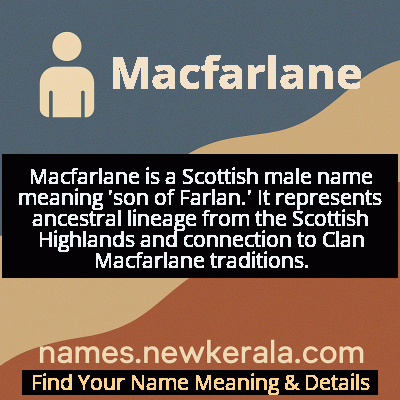Macfarlane Name Meaning & Details
Origin, Popularity, Numerology Analysis & Name Meaning of Macfarlane
Discover the origin, meaning, and cultural significance of the name MACFARLANE. Delve into its historical roots and explore the lasting impact it has had on communities and traditions.
Name
Macfarlane
Gender
Male
Origin
Scottish
Lucky Number
2
Meaning of the Name - Macfarlane
Macfarlane is a Scottish male name meaning 'son of Farlan.' It represents ancestral lineage from the Scottish Highlands and connection to Clan Macfarlane traditions.
Macfarlane - Complete Numerology Analysis
Your Numerology Number
Based on Pythagorean Numerology System
Ruling Planet
Moon
Positive Nature
Diplomatic, friendly, artistic, empathetic.
Negative Traits
Over-sensitive, moody, indecisive, prone to self-pity.
Lucky Colours
Green, cream, white.
Lucky Days
Monday.
Lucky Stones
Pearl, moonstone.
Harmony Numbers
1, 3, 4.
Best Suited Professions
Diplomats, mediators, caregivers, artists.
What People Like About You
Cooperative spirit, friendliness, artistic talent.
Famous People Named Macfarlane
John Macfarlane
Scottish clan chief
10th Chief of Clan Macfarlane during the Jacobite rising of 1745
George Macfarlane
Actor and singer
Broadway performer known for roles in 'Annie Get Your Gun' and television appearances
Alexander Macfarlane
Mathematician and physicist
Pioneered work in quantum mechanics and hyperbolic quaternions
Robert Macfarlane
Writer and academic
Award-winning author of books on landscape, nature, and travel
Name Variations & International Equivalents
Click on blue names to explore their detailed meanings. Gray names with will be available soon.
Cultural & Historical Significance
The name represents a connection to Scotland's turbulent history, clan loyalty, and the preservation of Gaelic traditions through centuries of political and social change. As a Highland clan name, Macfarlane embodies the resilience of Scottish culture through periods of English domination, the Highland Clearances, and cultural assimilation pressures. The clan's distinctive tartan and crest continue to be symbols of Scottish identity worldwide, particularly among diaspora communities maintaining their heritage.
Extended Personality Analysis
Individuals bearing the Macfarlane name are often perceived as possessing strong leadership qualities, resilience, and deep loyalty to family and community. These traits stem from the clan's historical role as protectors of their lands and people in the Scottish Highlands. The Macfarlane character typically combines practical wisdom with emotional depth, reflecting the balance required to survive and thrive in the challenging Highland environment.
There's often a noted independence of spirit coupled with respect for tradition, creating individuals who honor their heritage while forging their own paths. The name suggests someone with strong principles, determination in adversity, and a natural authority that commands respect without being overbearing. This combination of steadfastness and adaptability has allowed Macfarlanes throughout history to navigate changing circumstances while maintaining their core identity and values. The historical context of clan leadership and territorial responsibility often translates into modern contexts as reliability, organizational skills, and protective instincts toward those in their care.
Modern Usage & Popularity
In contemporary times, Macfarlane remains a respected Scottish surname that has spread globally through diaspora. While traditionally a surname, it's occasionally used as a distinctive first name, particularly in Scottish communities or among those celebrating Celtic heritage. The name maintains moderate popularity in Scotland, Canada, United States, Australia, and New Zealand—countries with significant Scottish immigration. Recent years have seen renewed interest in Scottish clan names as first names, though Macfarlane remains relatively uncommon in this usage. The spelling variation 'McFarlane' is more frequent in North America, while 'Macfarlane' preserves the traditional Scottish form. The name continues to represent Scottish identity and heritage in multicultural societies, often chosen by parents seeking to honor their ancestry while providing a strong, distinctive name for their children.
Symbolic & Spiritual Meanings
Symbolically, Macfarlane represents ancestral connection, territorial loyalty, and cultural endurance. The name evokes images of Highland landscapes—misty lochs, rugged mountains, and ancient stone structures—symbolizing deep roots and permanence. As 'son of Farlan,' it carries the metaphorical weight of lineage and inheritance, suggesting both the blessings and responsibilities that come from one's heritage. The clan's history of resilience through political turmoil and social change makes the name symbolic of survival and adaptation. In broader terms, Macfarlane symbolizes the preservation of cultural identity against external pressures, the strength found in community bonds, and the enduring power of tradition in a changing world. It represents the bridge between ancient Celtic culture and modern Scottish identity, embodying both historical continuity and contemporary relevance.

